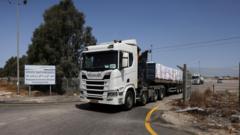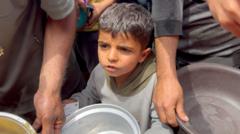Prime Minister Benjamin Netanyahu confirmed that a small quantity of food supplies would be permitted into Gaza after criticism of the ongoing blockade.
Israel Eases Gaza Blockade: Limited Food Aid to Prevent Famine Amid Criticism

Israel Eases Gaza Blockade: Limited Food Aid to Prevent Famine Amid Criticism
Israel's Prime Minister has announced a 'minimal' food aid allowance into Gaza, bowing to international pressure and highlighting the need to avert a humanitarian crisis.
Israeli Prime Minister Benjamin Netanyahu has announced the decision to allow a 'minimal' amount of food into the besieged Gaza Strip, a shift that follows mounting pressure from allies in the U.S. Senate. Highlighting the humanitarian implications, Netanyahu stated that "we must not reach a situation of famine," a comment made in a video addressing dissent over the move within Israel.
As part of this initiative, food deliveries will continue temporarily, while Israeli and American agencies set up hubs to manage aid distribution — a move met with skepticism from the UN. Netanyahu underscored that Israeli forces are advancing their military campaign against Hamas, which escalated over the weekend, with a stated aim of regaining control of all areas in Gaza.
The recent air strikes from Israel reportedly resulted in at least 20 casualties across Gaza, compounding an already dire situation. The Israeli military claims it targeted over 160 sites in a single day while urging residents of Khan Younis to evacuate due to planned attacks.
Israel's blockade, instituted on March 2, effectively cut off humanitarian aid and commercial supplies. Re-engaging military operations allegedly aimed to compel Hamas to release hostages. However, over the recent weeks, the fatalities from airstrikes and the continuing blockade have exceeded 3,000, leading to widespread hunger; reports indicate that 57 children have succumbed to malnutrition since March.
A UN-backed assessment indicated that 500,000 Gazans are facing acute food insecurity. Despite Israeli contentions that no severe shortages exist and that aid was previously sent during a ceasefire, the Israeli government has been criticized for exacerbating the situation.
Netanyahu's recent announcement to allow food supplies stems from rising pressure from U.S. senators concerned about potential famine images damaging Israel’s international standing. He stated a "red line" was approaching, necessitating action to address the crisis — suggesting a temporary allowance of basic food aid while the infrastructure for organized distribution is established.
This plan is opposed by key cabinet members including National Security Minister Itamar Ben-Gvir, who expressed vehement disagreement, fearing it would bolster Hamas.
The Prime Minister emphasized that his blockade of UN and humanitarian aid was due to concerns over evidence of Hamas's looting of resources. He also reiterated that major military operations are ongoing in Gaza to defeat Hamas, aiming to secure the release of remaining hostages, of whom 23 are believed still alive.
On October 7, 2023, Israel commenced military operations following a Hamas attack that resulted in significant casualties. Since then, the humanitarian toll in Gaza has escalated, with over 53,000 fatalities documented, including severe losses since the Israeli military's activities resumed. Negotiations between Israel and Hamas continue, but no breakthroughs have occurred in discussions regarding ceasefire or hostage exchanges.





















